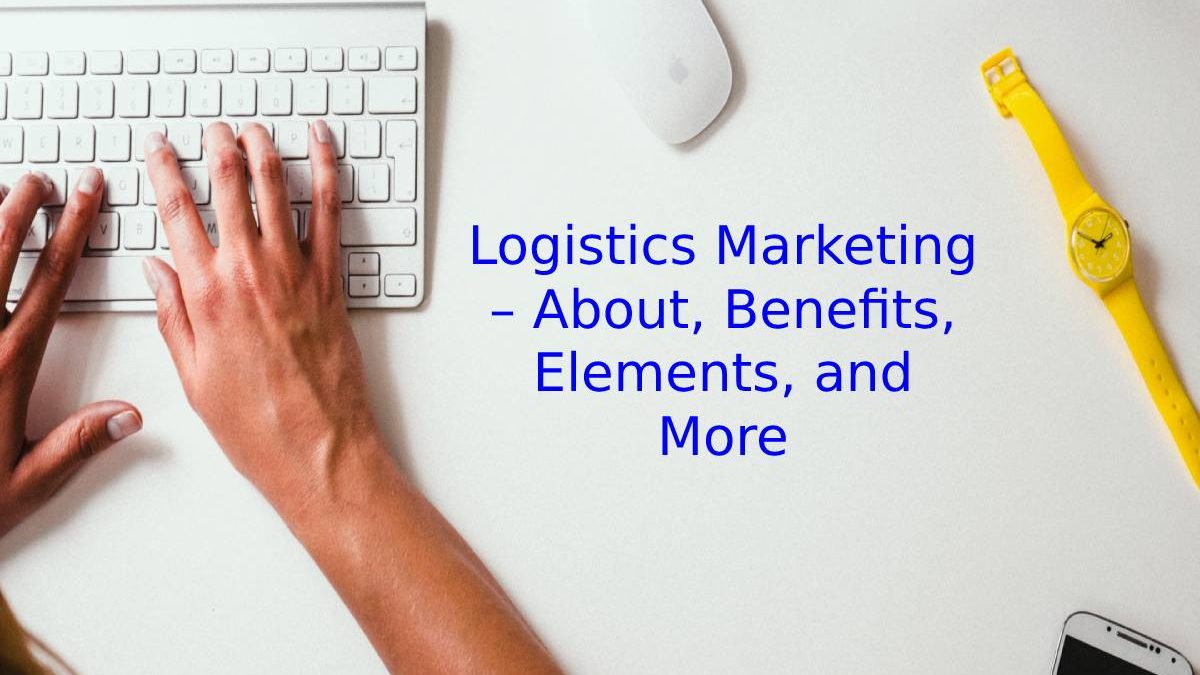Table of Contents
Logistics Marketing, a Differentiating Element in Business Competitiveness
Logistics Marketing – The growing complexity of the markets, in terms of participants, products or prices, forces us to offer comprehensive solutions to the needs of the public. Especially if we are at an early stage of the project and must concentrate our efforts on searching for potential clients.
Nowadays, technology simplifies many of these tasks. Therefore, more than financial resources, entrepreneurs require knowledge and skills to take advantage of the different platforms available in the market.
Logistics marketing, in this context, becomes one of the most beneficial practices. In addition to being manageable, regardless of the organization’s size, it ensures better performance and, above all, provides a better experience to consumers.
Would you like to learn more about this exciting topic? Then, you should review the content on logistics marketing that we will present below:
What is Logistics Marketing?
As the union of both terms suggests, it is a business mechanism aimed at improving performance during the tasks of supply, production, storage and marketing, taking into account the characteristics of the market.
Logistics marketing, therefore, integrates two functional areas of the company to plan each activity carried out from a strategic perspective and, among other functions, correct errors made on time.
5 Benefits of Logistics Marketing
1. Ensure Proper Supply
When a company forecasts the demand for its products, it can determine the quantities and properties of the raw materials and other products that it requires.
In this way, with the synergy achieved between both areas, delays, unnecessary financing, and excess products stored in stock are avoided.
2. Allows Effectiveness in Productive Activities
In addition to improving the use of resources, this mechanism helps us focus on the goals we want to achieve. For example: reach 100 units produced per day or maintain, at most, 5% of defective products each month.
3. It makes it possible to Create Standards
In this way, the quality of the products ensures by taking as reference parameters established internally (or the company’s own) and others selected by public institutions, auditing firms or even competitors.
4. Increase Satisfaction Levels regarding the transport service
Direct marketing directly affects the delivery of the products, whether in terms of the security offered, the preservation of physical properties (presentation) or the delivery time.
5. Increase Business Competitiveness
This mechanism makes it possible to optimize costs and reduce expenses to offer better prices and, consequently, obtain more attractive profit margins.
Likewise, it provides a better quality of service. Therefore, it allows demonstrating a differential value proposal before competitors and satisfactory to customers.
Elements of Logistics Marketing
In general, it is imaginable to recognize three common elements during logistics marketing actions, regardless of the sector or the size of the company:
1. The Market
It is made up of clients and/or consumers who have specific characteristics, needs, and interests. For these reasons, they must be studied objectively before, during and after any logistics marketing strategy.
2. The Supply Chain or supply chain
It refers to all the stages to which the raw materials and other production processes are subjected, in combination with technology, until the delivery of the finished product to the final consumer. In this case, the number of methods and the elapsed time does vary from one company to another.
3. The Delivery of Value

It describes the perception or level of satisfaction regarding the benefits of a product, a brand or even a company. For this reason, it has a decisive impact on sales both in volume and in economic terms.
5 Examples of Successful Logistics Marketing
When a company achieves the integration between marketing and logistics, it can be more competitive. In this way, it provides a quick response to the needs of its customers and avoids high advertising costs or the waste of productive assets.
Now that you know the most relevant aspects of this topic, we will present these five examples of logistics marketing from leading companies:
1. Logistics Marketing in Supermarkets
The supermarket chains are making intensive use of technology to provide solutions to their customers’ problems who, for reasons of time or due to factors beyond their control, cannot purchase the products in person.
In this case, they make their purchases online or by phone and receive the products at their homes. Mercadona would be a clear example of this type of company.
2. Logistics Marketing in restaurants and other food establishments
Unlike the previous example, where customers get different products such as food, drinks, detergents, personal hygiene items or any other type, restaurants have already offered this home delivery service for years.
The transformations or improvements, in this case, are evident in terms of the communication channels available today, the greater diversity of menus and the incorporation of intermediaries or distributors who earn commissions for their services.
3. Logistics Marketing on e-commerce Platforms
With the appearance of Amazon, eBay, Etsy, Alibaba or Mercadolibre. Buying and selling activities and logistics processes have acquired a greater geographical scope.
For this reason, offering comprehensive service to users, from answering their questions to knowing their impressions after the purchase or offering refund policies. Is essential to differentiate ourselves from competitors.
4. Logistics Marketing in hotels and other temporary accommodation options
The provision of services also uses logistics marketing in a certain way since it integrates a series of standardized processes or that. They can be, to achieve public satisfaction.
An example in this category would be Airbnb because it seeks to attract new clients or new service providers and seeks to guarantee user satisfaction. Regardless of the location of the rented property.
5. Logistics Marketing in Digital Services
Thanks to technology. We can automatically acquire a wide variety of services and enjoy them after a few minutes or even seconds.
Some examples would be: buying a domain on artists. Hiring a streaming service such as Netflix or Spotify, or simply buying a virtual course on Udemy. Without the support of a logistics marketing strategy. Those and those the delivery or provision of those services could take more time and. With it, reduce customer satisfaction.
Conclusion
Logistics marketing syndicates the potential of marketing and logistics to reinforce the brand and its differentiation. And it is that logistics management directly affects two essential pillars of any business: customer service and cost reduction.
Also Read: Web Development – Information, Front End Development, Resources, and More

